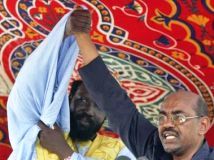Cries for unity resound as Sudan buries Garang
JUBA, Sudan, Aug 6 (AFP) — Huge crowds of grieving Sudanese bade a final farewell to late ex-rebel chief John Garang who led southern Sudan through two decades of war before becoming vice president in a landmark peace deal.

|
|
Sudan’s President Omar al-Bashir (R) and Salva Kiir, successor to the late vice president John Garang, shake hands after a funeral service for Garang in Juba, southern Sudan August 6, 2005. (Reuters). |
As tens of thousands of weeping, wailing black-clad mourners thronged the south’s main city for his funeral on Saturday, leaders from both the Muslim north and mainly Christian and animist south appealed for unity amid fears the deal could collapse and deep suspicion over the cause of the July 30 chopper crash that killed Garang.
In a service laden with symbols to reconciliation, Garang’s longtime nemesis, Sudanese President Omar el-Beshir, his widow, Rebecca, and successor as head of the Sudan People’s Liberation Movement (SPLM), Salva Kiir, urged adherence to the January’s historic accord.
Taking Kiir’s hand in a gesture of solidarity, Beshir told a massive crowd outside Juba’s All Saint’s Cathedral that Khartoum would not back away from the peace pact that many fear could unravel with Garang’s passing.
“We will be strong and together,” Beshir said. “We say to our brother Salva Kiir that we will remain hand-in-hand to apply the peace agreement to the letter.”
Kiir, who will soon assume the vice presidency that Garang had been sworn into just three weeks before his death, echoed those sentiments.
“I say it loud and clear that the SPLM is vehicle with no reverse gear,” Kiir said. “I reiterate my commitment to the implementation of all the clauses of the (peace deal),” he said.
Rebecca Garang said her husband’s legacy would be best honored by peace and urged mourners not to weep for her as long as they upheld the agreement under which south Sudan will enjoy six years of autonomy before a referendum on secession.
“I will not miss my husband as long the people of Sudan are the watchdogs of the (peace deal),” she said. “If you play around, I will start to cry and mourn my husband.”
“Leaders come and go, but what they leave behind is very important,” she said. “I want the (agreement) to be implemented as it is, no changes.”
In blistering heat under a blazing sun, dozens of distraught women fainted outside the cathedral while thousands of heavily armed Sudanese soldiers patrolled the streets and a UN helicopter buzzed overhead due to security concerns.
At the airport, the casket was unloaded from a plane by eight unarmed soldiers, four each from the Sudanese army and the SPLM, and laid on the tarmac before a military band played martial music to send off the cortege.
A crowd of at least 10,000 people, many singing and waving black flags and flags of Garang’s Sudan People’s Liberation Movement (SPLM), gathered in front of the church and along the route his cortege followed there from the airport.
Larger groups were seen in other areas of town on the road leading from the cathedral to a nearby former military field on a hilltop next to the state legislature where Garang was interred in a hastily constructed hexagonal tomb.
“Garang is a hero, he defied death in war, but only passed away in peace,” said mourner Peter Juok. “There is no reward God could gave him except dying in peacetime.”
“This is the worst tragedy in southern Sudan, we are saddened by the death of our leader, it will never be the same again in this part of the world,” said another mourner, Denis Lado.
Garang was killed when an official helicopter on which he was returning from Uganda crashed in what SPLM, Sudanese government and Ugandan officials have repeatedly said was an accident due to poor weather.
But on Friday, Ugandan President Yoweri Museveni, who provided Garang with the helicopter, said it might not have been an accident.
Such speculation was a major contributing factor to the riots that erupted in Khartoum, Juba and other southern towns when angry southerners attacked northerners, sparking reprisals.
At least 130 people died in the clashes and both the Sudanese government and the former rebels have expressed dismay at Museveni’s comments, with Sudan’s information minister calling them “extremely worrying.”
The violence has sparked fears the peace deal could unravel in the absence of the charismatic Garang, a US-educated agronomist who died at age 60, just three weeks after being sworn in as first vice president.
On Saturday, Beshir vowed to make public the results of an international investigation into the crash but this was of little comfort to many of Garang’s mourners who voiced open suspicion about his death and spoke of their resentment of the north.
“The northerners hate us, we hate them, so we demand our own country,” said Jacob Malwak, one of many SPLM partisans to crowd the cathedral grounds for the funeral.
“John was a great human being,” said mourner Myriam Nyuol. “Whether you like or not, unless everything about his death is transparent, the peace process will surely be wrecked at some point.”
UN special envoy Jan Pronk told reporters earlier that all the evidence collected by UN officials from the crash site so far suggested the helicopter had gone down accidentally.
